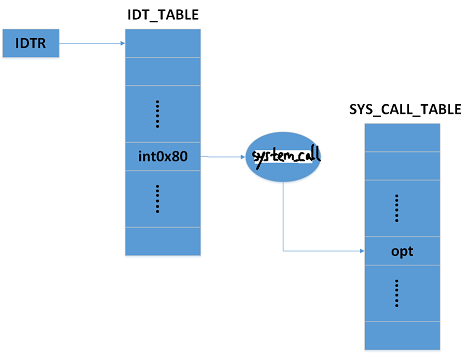那么在Linux内核2.6之后,不能直接导出sys_call_table的地址后,我们要如何获得系统调用表的地址,从而实现系统调用的截获呢。
先贴上我实现好的代码,然后再来讲解吧。
modu.c

#include<linux/init.h>
#include<linux/module.h>
#include<linux/moduleparam.h>
#include<linux/unistd.h>
#include<linux/sched.h>
#include<linux/syscalls.h>
#include<linux/string.h>
#include<linux/fs.h>
#include<linux/fdtable.h>
#include<linux/uaccess.h>
#include<linux/rtc.h>
MODULE_LICENSE("Dual BSD/GPL");
#define _DEBUG
#ifdef _DEBUG
#define kprintk(fmt,args...) printk(KERN_ALERT fmt,##args)
#define kprintf(fmt,args...) printf(fmt,##args)
#define kperror(str) perror(str)
#else
#define kprintk
#define kprintf
#define kperror
#endif
/*Function declaration*/
long * get_sys_call_table(void);
long * g_sys_call_table=NULL;//save address of sys_call_table
struct _idtr{
unsigned short limit;
unsigned int base;
}__attribute__((packed));
struct _idt_descriptor{
unsigned short offset_low;
unsigned short sel;
unsigned char none,flags;
unsigned short offset_high;
}__attribute__((packed));
/*Get the address of sys_call_table*/
long * get_sys_call_table(void){
struct _idt_descriptor * idt;
struct _idtr idtr;
unsigned int sys_call_off;
int sys_call_table=0;
unsigned char* p;
int i;
asm("sidt %0":"=m"(idtr));
kprintk(" address of idtr: 0x%x
",(unsigned int)&idtr);
idt=(struct _idt_descriptor *)(idtr.base+8*0x80);
sys_call_off=((unsigned int)(idt->offset_high<<16)|(unsigned int)idt->offset_low);
kprintk(" address of idt 0x80: 0x%x
",sys_call_off);
p=(unsigned char *)sys_call_off;
for(i=0;i<100;i++){
if(p[i]==0xff&&p[i+1]==0x14&&p[i+2]==0x85){
sys_call_table=*(int*)((int)p+i+3);
kprintk(" address of sys_call_table: 0x%x
",sys_call_table);
return (long*)sys_call_table;
}
}
return 0;
}
int monitor_init(void){
kprintk("Monitor init
");
g_sys_call_table = get_sys_call_table();
return 0;
}
void monitor_exit(void){
kprintk("Monitor exit
");
}
module_init(monitor_init);
module_exit(monitor_exit);
Makefile

obj-m := modu.o
KERNELDIR := /lib/modules/3.13.0-32-generic/build
PWD := $(shell pwd)
modules:
$(MAKE) -C $(KERNELDIR) M=$(PWD) modules
modules_install:
$(MAKE) -C $(KERNELDIR) M=$(PWD) modules_install
将modu.c和Makefile放在同一个目录下,执行“make”,编译程序,会生成modu.ko文件。
执行“sudo insmod modu.ko”,将modu.ko加载到内核中。
执行“dmesg”,查看系统日志,如图。

接下来就要解释解释原理了。
我们知道Linux系统中的系统调用是通过用户软件调用中断int0x80激发的,int0x80被执行后,内核获得CPU的控制权,并交由system_call程序处理。即sys_call_table是由system_call进行调用的。
而system_call是int0x80软中断,即int0x80中断对应的地址就是system_call函数的地址。而Linux系统中所有中断信息都保存在一张中断描述表IDT中,而这张表的地址又是保存在IDTR寄存器里面,所以整个截获过程可以用如下图表示。

即先在IDTR寄存器中获得IDT_TABLE的地址,再在IDT_TABLE中获得int0x80的地址,int0x80对应的是system_call函数的地址。最后通过system_call函数的地址获得sys_call_table的地址。
